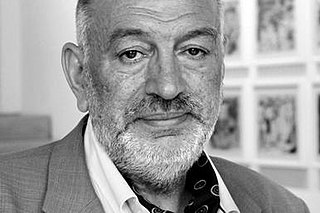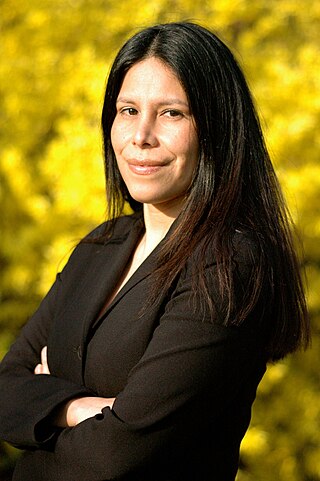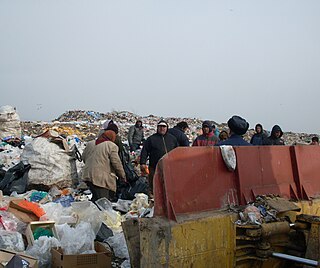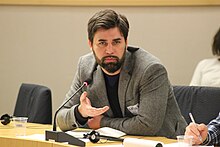In 2008 there were about 500-700 Romani people in Mitrovica refugee camps. These three camps were created by the UN in Kosovo. The camps are based around disused heavy metals mines which have fallen out of use since the end of the Kosovo War of 1999. There have been complaints that the residents are suffering severe lead poisoning. According to a 2010 Human Rights Watch, Romani displaced from the Romani quarter in Mitrovica, due to its destruction in 2000, continued to be inmates of camps in north Mitrovica, where they were exposed to environmental lead poisoning.

Human rights in Spain are set out in the 1978 Spanish constitution. Sections 6 and 7 guarantees the right to create and operate political parties and trade unions so long as they respect the Constitution and the law.

The Mława riot, or Mława incident, or Mława pogrom, was a series of violent devastations and looting incidents on 26–27 June 1991 when a group of youth estimated at 200 individuals, including young females, invaded the homes of Roma residents of the Polish town of Mława causing them to flee. Not a single Roma person was injured in the riot, but the material losses were substantial, affecting up to 40% of residences. Many perpetrators were arrested on-site; a number of them sentenced to jail after a trial. The violence was described as motivated by racism and jealousy. The incident that triggered the riot was the killing of a Polish pedestrian struck along with his companion in a hit-and-run by a Romani male driver.

Anti-Romani sentiment is a form of bigotry which consists of hostility, prejudice, discrimination, racism and xenophobia which is specifically directed at Romani people. Non-Romani itinerant groups in Europe such as the Yenish, Irish and Highland Travellers are frequently given the name "gypsy" and as a result, they are frequently confused with the Romani people. As a result, sentiments which were originally directed at the Romani people are also directed at other traveler groups and they are frequently referred to as "antigypsy" sentiments.
The Commissioner for Human Rights is an independent and impartial non-judicial institution established in 1999 by the Strasbourg-based Council of Europe, to promote awareness of and respect for human rights in the council's 46 member states. The activities of Commissioner focus on three major, closely related areas:
Barbora Bukovská is a Czech-Slovak human rights attorney and activist, known for her work on racial discrimination of Romani people in the Czech Republic and Slovakia. Before anti-discrimination laws were adopted, she initiated the first Czech strategic litigation cases concerning discrimination against Romani people in access to public services, housing, employment and within the criminal justice system, and used the courts to bring a change in the law.
European Roma Information Office (ERIO) is an international advocacy organization for Romani people based in Brussels, established on 18 March 2003 with Angéla Kóczé as the Director, announced on the Balkan Human Rights List by way of the Greek Helsinki Monitor.
The Gruber Prize for Justice, established in 2001, was one of five international prizes worth US$500,000 awarded by The Peter and Patricia Gruber Foundation, an American non-profit organization.
The Central Council of German Sinti and Roma is a German Romani rights group based in Heidelberg, Germany. It is headed by Romani Rose, who lost 13 members of his close family in the Holocaust.

Romani people in Hungary are Hungarian citizens of Romani descent. According to the 2011 census, they comprise 3.18% of the total population, which alone makes them the largest minority in the country, although various estimations have put the number of Romani people as high as 8% of the total population. They are sometimes referred as Hungarian Gypsies, but that is considered to be a racial slur.
The Centre on Housing Rights and Evictions (COHRE) was a Geneva-based international non-governmental organisation founded in 1994 by Scott Leckie as a foundation in the Netherlands.
According to the last census from 2021, there were 67,179 persons counted as Romani people in Slovakia, or 1.23% of the population. However, the number of Roma is usually underreported, with estimates placing the Roma population at 1-2% of the population. Thus the actual number of Roma may be over half a million.
D.H. and Others v. the Czech Republic was a case decided by the European Court of Human Rights (ECtHR) concerning discrimination of Romani children in the education system of the Czech Republic. It was the first case of racial segregation in education to be considered by the ECtHR. As of 2021 the case is still pending at the Committee of Ministers and has not been resolved by the Czech authorities.

Avocats Sans Frontières (ASF), also known as Advocaten Zonder Grenzen or Lawyers without Borders, is an international NGO, active in the human rights and development sector. Created in 1992 by a group of Belgian lawyers, ASF’s main objective is the realisation of institutions and mechanisms that facilitate access to independent and fair justice systems that ensure legal security and guarantee fundamental human rights for everyone.

The European Center for Constitutional and Human Rights (ECCHR) is an independent, nonprofit non-governmental organization with the aim of enforcing human rights through legal means. Using litigation, it tries to hold state and non-state actors responsible human rights violations. It was founded in 2007 by Wolfgang Kaleck together with a group of human rights lawyers, in order to help protect the rights guaranteed by the Universal Declaration of Human Rights, as well as other declarations of human rights and national constitutions, by juridical means. ECCHR engages in litigation, using European, international, and national law to help protect human rights.

The Roma Education Fund (REF) is a non-governmental organization established within the framework of the Decade of Roma Inclusion by Open Society Foundations and the World Bank in 2005. The organization's goal is to reduce the educational achievement gap between Roma and non-Roma in Europe through the provision of scholarships to Roma students, supporting the development of quality education, and supporting the removal of segregation of Roma students.

Nicolae Gheorghe was a Romanian human rights activist. He was born in Risiori de Vede.

Monica Feria Tinta is a British-Peruvian barrister, a specialist in public international law, at the Bar of England & Wales. She practises from Twenty Essex, London. "The Lawyer" magazine featured her in its "Hot 100" 2020 list, as amongst "the most daring, innovative and creative lawyers" in the United Kingdom. She has also been shortlisted as "Barrister of the Year" by the Lawyer's Awards 2020, alongside Lord Pannick QC, one of the UK's highly regarded advocates.
On 19 June 2021, Stanislav Tomáš, a Romani man in Teplice, Czech Republic, died after several police officers pinned him to the ground and knelt on his neck for several minutes. The death was filmed and the video went viral, leading to comparisons with the murder of George Floyd in the United States and led to protests against antiziganism.

Environmental racism in Central and Eastern Europe is well documented. In Central and Eastern Europe, socialist governments have generally prioritized industrial development over environmental protection, in spite of growing public and governmental environmental awareness in the 1960s and 1970s. Even though public concern over the environmental effects of industrial expansion such as mine and dam construction grew in the late 1980s and early 1990s, policy makers continued to focus on privatization and economic development. Following the market transition, environmental issues have persisted, despite some improvements during the early stages of transition. Throughout this time, significant social restructuring took place alongside environmental changes.










